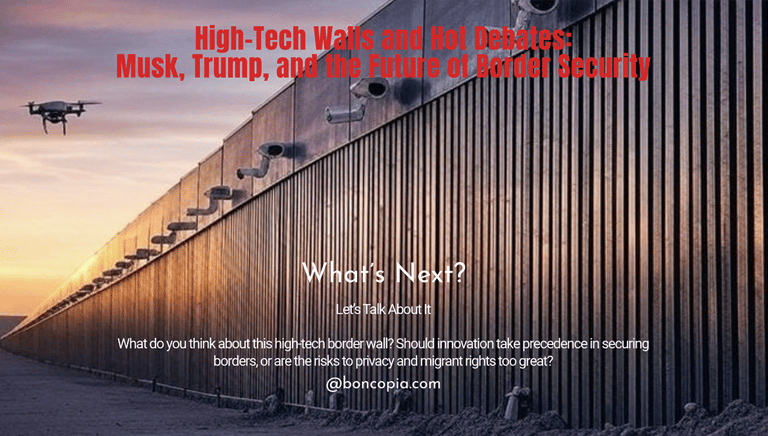High-Tech Walls and Hot Debates: Musk, Trump, and the Future of Border Security
4/19/20253 min read


High-Tech Walls and Hot Debates: Musk, Trump, and the Future of Border Security
Imagine a towering wall along the US-Mexico border—not just a physical barrier, but a futuristic fortress buzzing with cutting-edge tech. Drones hover overhead, AI algorithms scan for movement, and biometric sensors identify travelers in seconds. Sounds like a sci-fi movie, right? Well, this vision might soon become reality, as Elon Musk and Donald Trump are reportedly teaming up to secure the border with a high-tech wall system. A recent X post from Tucker Carlson News, retweeting
@SaveAmericaNew, sparked a firestorm of reactions with this bold claim on April 17, 2025. Let’s dive into what this means—and why it’s stirring up so much controversy.
A Partnership That Packs a Punch
Elon Musk, the billionaire innovator behind Tesla and SpaceX, has long been vocal about border security. Back in 2023, he visited Eagle Pass, Texas, to livestream the border crisis, advocating for a Trump-style wall. Fast forward to 2025, and Musk’s ideas seem to be gaining traction with none other than Donald Trump, who has made border security a cornerstone of his political agenda. According to a White House fact sheet from February 2025, Trump has been leveraging tariffs to pressure countries like Mexico and Canada, tying trade policy to national security. Now, with Musk’s technological prowess in the mix, the duo appears poised to redefine what a "secure border" looks like.
The proposed system isn’t just concrete and steel. Think "smart borders"—a term that’s been floating around since at least 2022, when the Migration Policy Institute highlighted the global rise of AI in border control. These systems use facial recognition, emotional analysis algorithms, and drones to detect illegal crossings, promising faster processing and better security. But here’s the catch: they also come with a host of ethical dilemmas.
The Tech: A Double-Edged Sword
On one hand, the tech sounds impressive. Border-focused AI can differentiate humans from wildlife in remote areas, as noted in a 2020 Atlantic article. It can speed up travel with “smart gates” at airports, already in use globally. For a country grappling with immigration challenges, this could be a game-changer. Trump’s base, in particular, has long rallied behind his promise to "seal the border," and Musk’s involvement adds a layer of credibility—after all, who better to innovate than the man who’s revolutionizing space travel?
But there’s a darker side. Amnesty International warned in 2024 that such technologies often undermine the human rights of migrants. Facial recognition and surveillance systems can lead to "technology creep," where tools meant for borders start seeping into everyday life, eroding privacy for everyone. Migrants, especially those with insecure status, are particularly vulnerable. They often lack the ability to opt out or seek redress if the tech misidentifies them—imagine being flagged as a threat because an algorithm misreads your emotional state. The Migration Policy Institute also raised red flags about privacy, noting that these systems could disproportionately target vulnerable populations, exacerbating inequalities.
Why It’s Sparking Debate
The Musk-Trump collaboration has reignited a polarizing debate. Supporters argue it’s a necessary step to curb illegal immigration and trafficking, aligning with Trump’s recent tariff moves to pressure neighboring countries. Critics, however, see it as a dangerous overreach. The idea of a high-tech wall isn’t just about keeping people out—it’s about who gets to decide what “security” means, and at what cost. With Musk’s history of wading into political controversies (remember his Ukraine war comments?) and Trump’s hardline immigration stance, this partnership is a lightning rod for discussion.
What’s Next?
As of April 19, 2025, details on the project remain sparse, but the implications are massive. If this high-tech wall becomes reality, it could set a precedent for how nations use technology to manage borders—and how they balance security with human rights. Will this be a triumph of innovation, or a step toward a dystopian future where surveillance knows no bounds?
Let’s Talk About It
What do you think about this high-tech border wall? Should innovation take precedence in securing borders, or are the risks to privacy and migrant rights too great? How far should governments go in using AI for national security? Drop your thoughts in the comments—I’d love to hear your take!
hello@boncopia.com
+13286036419
© 2025. All rights reserved.